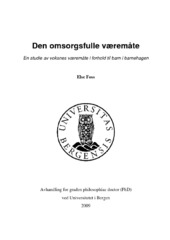| dc.description.abstract | In Norway, children who attend a kindergarten have a legal right to receive care. This legal right is the juridical context of the present study and I describe care as a legal “shall”-obligation for adults in kindergarten. The study investigates the notion of adult´s caring way of being in relation to children who are in a situation where they express a need of care. One aim of the study is to show how a caring way of being is facilitated and hampered. Furthermore, the thesis aims to examine the nature of this caring way of being. I also wish to examine the relationship between a caring way of being and the upbringing and the rearing of children. The care function of kindergarten is seen, in my study, to have priority over the upbringing function. A 5 ½ months fieldwork was carried out in a kindergarten. I use the methodology of participant observation and individual interviews with seven preschool teachers and assistants. The analytic tools are constructed in a way that allows me to perform three different analyses: an empirically-based analysis, a theoryinspired analysis and a superior analysis. All findings are related to observations. The theoretical framework is constituted by the philosophical perspectives of Knud E. Løgstrup and Reidar Myhre´s pedagogical theories about child rearing. In the first analysis I examine how a caring way of being can be facilitated. However, this analysis also points to one superior finding by indicating that a caring way of being is facilitated by a unifying contradiction between closeness and distance. By this I mean that seemingly contradictory concepts, such as closeness and distance, need to be unified in caring. The two other analyses are related to observations of situations where children are crying and I investigate the ways in which these children are met by the adults. One main finding of the superior analysis is that the grown-ups’ way of being has a general conditioning effect on the children. Since small children are highly formative, the very bodily presence of kindergarten adults will, in some way or other, have an effect on the children. This unintentional influence can be referred to as premeditated normative childrearing – it will happen whether the adult is aware of it and plans on it vi or not. Meditated normative childrearing can be said to have a caring way of being as its prerequisite. Furthermore, meditated normative childrearing without caring and caring child rearing can be described as a separating contradiction. The two elements here are in an either-or relationship. The second main finding has to do with how a caring way of being can be hampered. I regard a caring way of being as a culturally, moral “ought”- obligation. It does not seem possible to have a caring attitude without showing a caring way of being. The adult is the care. A caring attitude and a way of being that is without comfort and ignores, punishes or rejects children, can thus be referred to as a separating contradiction. I describe the latter as caring deceit and a way of being that is void of care. If an adult fails to respond spontaneously to a child who expresses emotional difficulties, his/her care is inadequate. However, postponed caring is better than no caring at all. Caring is described as a pre-culturally, ethical “ought”- obligation. My third main finding has to do with how a caring way of being is promoted. Here, I focus on the importance of employing an ongoing care-based pedagogical assessment (Norwegian: skjønn) in order to understand the child´s situation and to be able to change a difficult situation to the better for the child. The term “pedagogical” here refers to the upbringing of the child. One of my findings is that care and childrearing are two sides of the same coin when it comes to the adults´ way of being. Care can be seen as a pre-cultural necessity of life, while child-rearing can be seen as a cultural necessity. My three main interpretive findings can be summarized as follows: A caring way of being is regarded as a culturally, moral “ought”- obligation which has a legal “shall”- obligation as a prerequisite on the one hand and a pre-culturally, ethical “ought”- obligation on the other. To esteem a life is the leading cultural value in this ethical understanding. In other words, the caring way of being is located in the area where these three normative obligations meet. | en_US |
